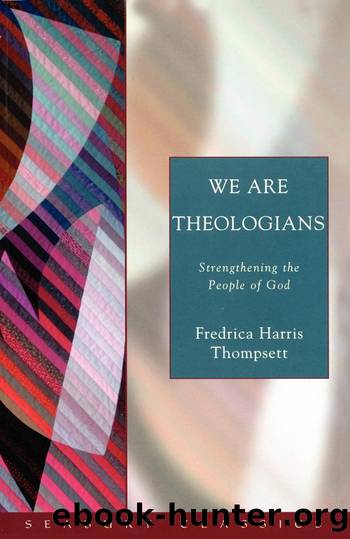We Are Theologians by Fredrica Harris Thompsett

Author:Fredrica Harris Thompsett
Language: eng
Format: epub
ISBN: 9781596280168
Publisher: Church Publishing Inc.
Published: 2017-05-10T00:00:00+00:00
Rejoicing in Creation
In yet another way foundational Anglican theology is out of step with traditional Protestant theology and contemporary, conservative Christianity. Anglican theology has traditionally stressed the goodness of creation. There are two interrelated aspects to this affirmation. Anglican theologians have pointed to the excellency of the whole created order, and they have reverenced the earth, not heaven above, as the primary sphere of Godâs continuing operation. Anglican theology does not apologize for the fact that it is firmly grounded in society in life in this world. The prayer book conveys these optimistic themes in a eucharistic petition:
Open, O Lord, the eyes of all people to behold thy hand in all thy works, that, rejoicing in thy whole creation, they may honor thee with their substance, and be faithful stewards of thy bounty.
Again and again the prayer book asks us to go back to the Genesis story of a God who created as an act of love. It is as if we are called to share Godâs evident delight with each day of creation, repeating the biblical refrain, âIt was good...it was very good.â
For Hooker and for later Anglican theologians, nature was, along with the Bible, another source of divine revelation. Hooker often wrote of the personal, authoritative character of Godâs relation to the created order: âAll things are therefore partakers of God, they are his offspring, his influence is in them.â In a lyrical passage from the Laws of Ecclesiastical Polity he describes several sources of wisdom:
Some things she [wisdom] openeth by the sacred books of Scripture; some things by the glorious works of nature: with some things she inspireth them from above by spiritual influence, in some things she leadeth and traineth them only by worldly experience and hard practice.
Next to the primary biblical base of knowledge, nature joined revelation in teaching Godâs goodness. Joseph Hall, a seventeenth-century bishop and author of the popular devotional guide Arte of Divine Meditation (1606), encouraged his readers to contemplate the glories of nature as âGodâs Great Book.â His contemporary, the naturalist John Ray, expressed his appreciation in The Wisdom of God Manifested in the Works of Creation. These and other authors laid the foundations of natural theology in Anglicanism. Poets and mystics who were to join in this estimation of the âglorious works of natureâ included Samuel Taylor Coleridge, T. S. Eliot, Evelyn Underhill, and Annie Dillard.
In my childhood Anglican hymnody offered the most lyrical, certainly the most consistent, liturgical reminders of the goodness of creation. There is the refrain, now repeated in a contemporary novel and television series:
All things bright and beautiful,
All creatures great and small,
All things wise and wonderful,
The Lord God made them all.
Other favored lyrics from my childhood include:
For the beauty of the earth,
For the beauty of the skies,
For the love which from our birth,
Over and around us lies....
And that powerfully specific hymn to joy:
Field and forest, vale and mountain,
Blooming meadow, flashing sea,
Chanting bird and flowing fountain,
Call us to rejoice in thee.
This theological regard for the whole of creation goes against the grain of most Protestant and Catholic thought.
Download
This site does not store any files on its server. We only index and link to content provided by other sites. Please contact the content providers to delete copyright contents if any and email us, we'll remove relevant links or contents immediately.
| Baptist | Book of Common Prayer |
| Calvinist | Episcopalian |
| Inspirational | Lutheran |
| Methodist | Pentecostal & Charismatic |
| Presbyterian | Quaker |
| Seventh-Day Adventist | Shaker |
| Theology |
Fangirl by Rainbow Rowell(9228)
How to Bang a Billionaire by Alexis Hall(8144)
Wonder by R. J. Palacio(8097)
The Space Between by Michelle L. Teichman(6927)
The Thirst by Nesbo Jo(6925)
Assassin’s Fate by Robin Hobb(6197)
Wiseguy by Nicholas Pileggi(5767)
The Night Circus by Erin Morgenstern(5215)
Paper Towns by Green John(5175)
The Kite Runner by Khaled Hosseini(5163)
Bittersweet (True North #1) by Sarina Bowen(4842)
Gerald's Game by Stephen King(4640)
Too Much and Not the Mood by Durga Chew-Bose(4336)
Pillow Thoughts by Courtney Peppernell(4271)
Goodbye Paradise(3798)
Twelve Days of Christmas by Debbie Macomber(3559)
Good by S. Walden(3545)
The Rosie Effect by Graeme Simsion(3459)
The Cellar by Natasha Preston(3333)
